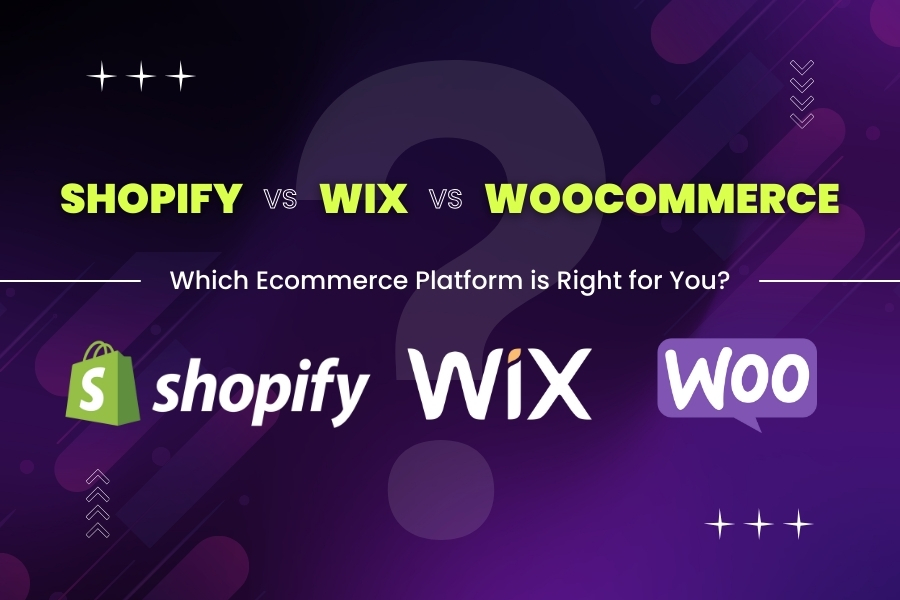
Shopify vs. Wix vs. WooCommerce: Which Ecommerce Platform is Right for You?
Selecting the top e-commerce platform is essential for your business's success in the realm of online shopping. Selecting the platform that best meets your goals might be overwhelming due to the abundance of possibilities. Shopify, Wix, and WooCommerce are three of the leading e-commerce systems available today. Every platform has advantages and disadvantages of its own, so in order to choose wisely, it's critical to comprehend how they differ.
Overview of Leading E-Commerce Platforms
The best ecommerce platform to use when opening an online store is an important choice that can affect the expansion and success of your company. Let's compare Shopify, Wix, and WooCommerce to help you decide which platform best suits your needs as a business.
Shopify: Powered by Global Online Retailers.
- One of the top e-commerce platforms for companies of all sizes is Shopify.
- Shopify is well-known for its comprehensive feature set and user-friendly interface, which make it easier to set up and manage an online store.
- Shopify, which has over a million active users worldwide, provides scalability and flexibility to accommodate businesses' changing demands.
Wix: An E-Commerce-Capable Website Builder.
- Popular website builder Wix offers e-commerce capabilities with its Wix Stores feature.
- Perfect for entrepreneurs and small enterprises who lack considerable technical knowledge but still want to develop an online store that looks good.
- Wix provides a range of template options together with drag-and-drop features for simple website customization.
WooCommerce: The E-Commerce Plugin for WordPress
- An open-source e-commerce plugin for WordPress websites is called WooCommerce.
- extensively utilized by companies looking for a flexible and adaptable e-commerce solution that works with their WordPress website.
- WooCommerce's huge library of plugins and themes enables significant customization to fit certain business requirements.
Comparing the Main Elements
Usability:
- Shopify. Drag-and-drop capabilities and an intuitive UI make setting up a store a breeze.
- Wix. An easy-to-use platform with basic customization capabilities that is appropriate even for novice users.
- WooCommerce. Offers freedom in design and functionality, but requires a foundational understanding of technology.
Style and Personalization:
- Shopify. A wide selection of well created templates with personalization choices.
- Wix. A large collection of templates that can be edited with drag-and-drop for customized designs.
- WooCommerce. Offers a wide range of theme and plugin customization options for creative store designs.
Payment Options:
- Shopify. Shopify offers integrated payment gateway options that accept a variety of payment methods in addition to major credit cards.
- Wix. A variety of payment channels, including as PayPal, Stripe, and others, are available.
- WooCommerce. Offers flexibility in payment processing by supporting several payment gateways through extensions.
Flexibility and Scalability:
- Shopify. An expandable platform with built-in capabilities for business growth, appropriate for companies of all sizes.
- Wix. Not as scalable as Shopify, but still good enough for small to medium-sized enterprises.
- WooCommerce. Exceptionally adaptable and expandable, perfect for companies seeking a wide range of customization choices.
SEO Proficiencies:
- Shopify. Shopify built-in SEO capabilities to increase exposure in search results pages.
- Wix. Provides rudimentary SEO tools for search engine optimization of website content.
- WooCommerce. Provides strong SEO features for improved visibility with plugins like Yoast SEO.
Cost Structure:
- Shopify. Monthly subscription rate beginning at $29, plus extra transaction fees for lower-tier subscriptions.
- Wix. e-commerce features are included in higher-tier plans, with a range of pricing options beginning at $23 per month.
- WooCommerce. This free plugin offers optional premium extensions for further functionality, making it an affordable solution for companies on a tight budget.
Assistance and Materials:
- Shopify. Shopify offers a wealth of community forums, comprehensive documentation, and round-the-clock phone, email, and live chat assistance.
- Wix. A knowledge base containing materials for self-help is provided, along with phone and email customer care.
- WooCommerce. Support provided by the community via forums, documentation, and help from outside developers.
Conclusion
To sum up, the top e-commerce platform selection is contingent upon your unique business needs, financial limitations, level of technological proficiency, and desired rate of expansion. Shopify is the most user-friendly and scalable platform; Wix is more straightforward when it comes to modification of designs; and WooCommerce, being open-source, allows a great deal of freedom. Assess your requirements carefully in comparison to the essential aspects covered above to ascertain which platform best fits your objectives for your online store. Keep in mind that every platform has advantages and disadvantages, so before choosing one, you must decide what is most important to your company.


